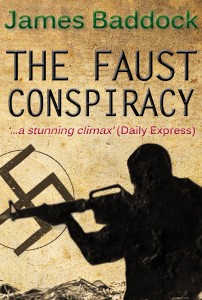 The Faust Conspiracy was my first book and went through umpteen rewrites before it was finally accepted for publication by Malvern Publishing, a small company that was on the lookout for new authors, but which has since gone out of business. I started on the book when I was recuperating after a minor operation (they call them procedures nowadays) and I was trying to read a not very good thriller. I commented to my better half that I could do better myself, so she challenged me to have a go. So I did. The idea was based on an old newspaper cutting recycled in the local press, describing how German paratroopers landed in the Luton Hoo estate during World War II and were promptly arrested before being taken off to London. The cutting did not deal with their subsequent fate and I began to wonder what they were doing there and what did finally happen to them…
The Faust Conspiracy was my first book and went through umpteen rewrites before it was finally accepted for publication by Malvern Publishing, a small company that was on the lookout for new authors, but which has since gone out of business. I started on the book when I was recuperating after a minor operation (they call them procedures nowadays) and I was trying to read a not very good thriller. I commented to my better half that I could do better myself, so she challenged me to have a go. So I did. The idea was based on an old newspaper cutting recycled in the local press, describing how German paratroopers landed in the Luton Hoo estate during World War II and were promptly arrested before being taken off to London. The cutting did not deal with their subsequent fate and I began to wonder what they were doing there and what did finally happen to them…
I wrote it in longhand, using a fountain pen and an awful lot of A4 paper, before typing it out, firstly using a typewriter (remember those?) and then on an Apple II computer, using Apple Writer. As the computer had an awesome 48K memory (well, it was awesome in those days), the text had to be saved chapter by chapter onto six 5.25 inch floppy disks (remember those as well?) before being printed out by a daisywheel printer onto fanfold paper, which took several hours, as I recall. Happy days…
It took seven years in the end for it to be published (in 1985), and it suffered numerous redrafts along the way. Entire sequences were edited out, as were characters, but the basic storyline – a plot to assassinate King George VI in 1944 – remained the same. However, before it finally saw the light of day, I had to find a publisher and I soon realised that, without a literary agent, I had little or no chance of achieving that – then as now, the fate of most unsolicited manuscripts received by any publisher was to be consigned to the ‘slush pile’, where it might be given a cursory reading by a junior employee, but, equally, it might simply be returned, unread, to the author several months down the line, accompanied by a form letter. I sent out letters to a number of literary agents listed in The Writers’ and Artists’ Yearbook (an invaluable resource even today) and one of them forwarded my name to Malvern Publishing, a small company based in Upton-on-Severn, which was just starting up with the noble (if perhaps quixotic) ambition of launching new authors. The Faust Conspiracy was the sixth book published by Malvern and was reviewed (very favourably) in the Daily Express. Despite this, it did not crash its way into the bestseller lists and any dreams that I had about retiring from teaching soon faded away.
Within a couple of years, however, the US rights were bought up by Walker Books in New York and The Faust Conspiracy, new cover and all, was released in the USA and Canada in 1989, achieving significantly more sales than in the UK (in fact, overall, I have sold considerably more books in the States than over here). Again, the royalties were not enough for me to retire, but they more than paid for a holiday for two that year.
With the passing of the years, however, I began to become more aware of Faust‘s weaknesses – there was too much exposition in the narrative, Vogel’s character was far too sketchy, the relationship between Paul and Carolyn did not make sense, Tyler was little more than a name and so on. As a result, when I decided to convert the books into ebook format, I initially decided not to include Faust in the process – there was too much that needed to be rewritten. But then I took another look at it and realised that there were enough ‘good’ bits to make it worth revisiting. Vogel was given a more detailed back story, the character of his co-conspirator was made more substantial, the romance between Paul (now renamed Keller) and Carolyn became a friendship but nothing more, Tyler was given added depth by the introduction of a sub-plot that threw light on his life outside MI5 and the narrative was adapted to reflect far more of a ‘show, don’t tell’ approach. The final result was that the book, which had always been on the short side at 56,000 words grew to over 73,000 and, IMHO, is all the better for it. So, although it’s taken over thirty years, The Faust Conspiracy has now finally been completed.
For now, anyway…